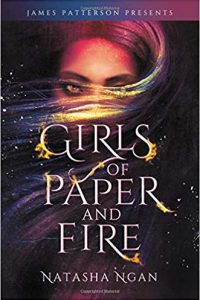Gary K. Wolfe Reviews Black Water Sister by Zen Cho
 Black Water Sister, Zen Cho (Ace 978-0425283431, $14.99, 384pp, tp) May 2021.
Black Water Sister, Zen Cho (Ace 978-0425283431, $14.99, 384pp, tp) May 2021.
Zen Cho quickly earned a reputation for wit and style with her debut novel Sorcerer to the Crown, with its entertaining but sharp critique of racism, sexism, and colonialism in Regency England, but the novel also introduced a powerful Malaysian witch. Malaysian magic played a more central role in the sequel The True Queen, but none of this should have surprised readers of Cho’s first book, the Crawford Award-winning Spirits Abroad, which will be reissued later this year in an expanded edition from Small Beer Press. The stories in that collection were rich in Malaysian and Chinese lore, and so is Cho’s new novel Black Water Sister. With its contemporary setting, family tensions, and issues ranging from cultural homophobia to predatory real estate development, it may seem a departure for admirers of the Sorcerer Royal novels, but in fact it rings closer to home than almost anything I’ve seen from this talented author. If she was playing with Regency romances in those earlier novels or with wuxia traditions in her novella The Order of the Pure Moon Reflected in Water, here she’s writing in a voice that is utterly contemporary, with a setting that derives from acute character observation rather than historical invention. As much as we might have enjoyed her version of Regency England, those of us unfamiliar with Malaysia come away from Black Water Sister practically feeling we could make our way around Cho’s vivid portrait of Penang without a guidebook.
That is not to suggest that the novel lacks supernatural fireworks. Jess Teoh, an unemployed Harvard grad who had moved to the US as a child, has to return to Malaysia with her parents after her father loses his job, mostly as a result of a serious illness. Not long after, she begins hearing a distinct voice in her head, which turns out to be her recently deceased grandmother Ah Ma, a delightful cross between a cantankerous meddling relative and a more ominous manipulative spirit. Ah Ma has failed or refused to move on because of unfinished business, some of which involves a real estate magnate whose latest development involves destroying the shrine of a local goddess, the Black Water Sister of the title. Jess’s involvement with her grandmother and the goddess – either of whom might take over her body and lend her unexpected strength – leads to some harrowing confrontations with corporate gangsters, including an attempted rape and murder which some readers might find disturbing, but also to an odd near-alliance with the son of the predatory real estate developer.
Along with the supernatural elements is the tale of Jess’s own family, which is compelling in its own way. Jess and her parents have been taken in by a wealthy relative in Penang, at least until her father can earn enough money to afford their own home and, as if Jess didn’t have enough problems adjusting to a society she barely knows and trying to deal with a meddlesome ghost in her head, she’s not yet told her parents that she’s gay, or about her lover Sharanya, whom she hopes to eventually join in Singapore. (The mostly offstage Sharanya is a fairly amorphous character we could do to learn more about.) One of Jess’s more unsettling visions doesn’t directly involve battling ghosts or gods or gangsters, but rather the fear that Jess’s sexual orientation might cause her wealthy relatives to evict her whole family, given Malaysian attitudes toward homosexuality, which the novel doesn’t shy away from. Black Water Sister is suspenseful enough as a supernatural adventure to keep most readers enthralled, but it’s equally engaging on the level of purely mimetic fiction, examining the very real issues of family, culture, and identity that haunt Jess as much as her family ghosts. But then, maybe that’s what family ghosts really are in the first place.
Gary K. Wolfe is Emeritus Professor of Humanities at Roosevelt University and a reviewer for Locus magazine since 1991. His reviews have been collected in Soundings (BSFA Award 2006; Hugo nominee), Bearings (Hugo nominee 2011), and Sightings (2011), and his Evaporating Genres: Essays on Fantastic Literature (Wesleyan) received the Locus Award in 2012. Earlier books include The Known and the Unknown: The Iconography of Science Fiction (Eaton Award, 1981), Harlan Ellison: The Edge of Forever (with Ellen Weil, 2002), and David Lindsay (1982). For the Library of America, he edited American Science Fiction: Nine Classic Novels of the 1950s in 2012, with a similar set for the 1960s forthcoming. He has received the Pilgrim Award from the Science Fiction Research Association, the Distinguished Scholarship Award from the International Association for the Fantastic in the Arts, and a Special World Fantasy Award for criticism. His 24-lecture series How Great Science Fiction Works appeared from The Great Courses in 2016. He has received six Hugo nominations, two for his reviews collections and four for The Coode Street Podcast, which he has co-hosted with Jonathan Strahan for more than 300 episodes. He lives in Chicago.
This review and more like it in the May 2021 issue of Locus.
 While you are here, please take a moment to support Locus with a one-time or recurring donation. We rely on reader donations to keep the magazine and site going, and would like to keep the site paywall free, but WE NEED YOUR FINANCIAL SUPPORT to continue quality coverage of the science fiction and fantasy field.
While you are here, please take a moment to support Locus with a one-time or recurring donation. We rely on reader donations to keep the magazine and site going, and would like to keep the site paywall free, but WE NEED YOUR FINANCIAL SUPPORT to continue quality coverage of the science fiction and fantasy field.
©Locus Magazine. Copyrighted material may not be republished without permission of LSFF.






